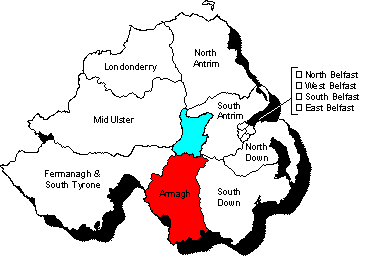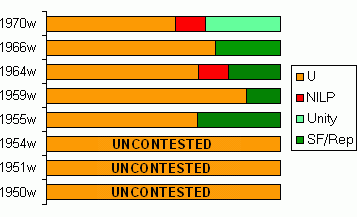

 |

|
|
|
|
|

|

|
| Map and diagram by Conal Kelly | |
This constituency incorporated all of county Armagh. Established in 1920 by the merging of the three previous constituencies,it was not not changed in the 1948 boundary revisions. Between 1950 and 1970 the constituency was represented by three different MPs, all of whom were Unionist. The longest serving of these was John Maginnis who was first elected in 1959 and continued to represent the constituency until his retirement in 1974. The general elections of 1950 and 1951, and a by-election in 1954, were won by the Unionist candidate withour a contest.
See also election results for Armagh 1973-1982.
| U | NILP | Unity | SF/Rep | |
| 1970w | 55.3% | 12.9% | 31.8% | |
| 1966w | 72.0% | 28.0% | ||
| 1964w | 65.0% | 12.0% | 22.9% | |
| 1959w | 85.5% | 14.5% | ||
| 1955w | 64.4% | 35.6% | ||
| 1954w-b | * | |||
| 1951w | * | |||
| 1950w | * |
* The only candidate nominated in the 1950 and 1951 General Elections was the Unionist, Major James Harden. The only candidate nominated for the 1954 by-election was the Unionist, Christopher Armstrong. In each instance the sole candidate was therefore duly elected without a contest.
Unionist majority: 15,971; electorate: 86,847; votes cast: 78.5%
Maginnis
contested his fourth and final election in 1970. His primary opposition
was Unity candidate Hugh Lewis. Also contesting the election was NILP
candidate Erskine Holmes. When the counting was completed, Maginnis was
returned to serve his fourth consecutive term at Westminster. Polling
over 21,000 Lewis had demonstrated an ability to successfully channel
the constituency's nationalist vote, something the republican
candidates had failed to do in previous three elections. Holmes also
polled a respectable 8,781 votes, slightly improving on the NILP's 1964
outing.
Holmes would later contest South Belfast for the NILP in the February
and October general elections of 1974.
Unionist majority: 21,220; electorate: 76,111; votes cast: 63.3%
Maginnis
faced a new opponent in 1966. Charles McGleenan, a former IRA member,
had previously contested the constituency in 1935 (which must be one of
the longest gaps between candidacies in electoral history). Maginnis
again achieved a comfortable victory, with only a slight reduction in
his majority. McGleenan managed to improve on the 1964
republican vote but polled about 3,000 votes less than his 1935 outing.
McGleenan had been an Anti-Partition member of the Northern Ireland House of
Commons for South Armagh from 1950 to 1958. He did not take his seat.
Unionist majority: 22,791; electorate: 74,184; votes cast: 73.0%
Maginnis and Lynch squared-off in a repeat of the 1959 election, however, this time they were joined on the ballot by Samuel Ewart of the Northern Ireland Labour Party. Sinn Fein was now a proscribed organization so Lynch contested the election under the label ‘Republican’. Maginnis managed to successfully defend his seat, although his majority dropped slightly. Lynch was able to improve on his 1959 tally but was still some way off the high watermark of 1955.
Unionist majority: 33,502; electorate: 73,416; votes cast: 64.2%
The incumbent Christopher Armstrong did not seek re-election and the Unionist Party nominated Ulster Farmers' Union Group Secretary, John Maginnis, as their candidate. His opponent was John Lynch representing Sinn Fein on an abstentionist ticket. The result was a clear victory for Maginnis with a massive majority of over 23,000. Armagh was a stark example of how the Sinn Fein vote fell right across Northern Ireland, as a result of the IRA's divisive Operation Harvest campaign.
Unionist majority: 17,254; electorate: 72,492; votes cast: 82.7%
The Unionist incumbent,
Christopher Armstrong, had been elected the previous year in a by-election.
This time, however, he faced his first electoral contest, with Sinn Fein's
Tomas MacCurtain being his sole opponent. The result was a clear victory for
Armstrong with a sizable majority of over 17,000.
One interesting footnote is that MacCurtain had served a sentence in the Irish
Republic for the murder of a policeman in County Cork. He was also the son of the former Lord Mayor of Cork (with the same name) who had been murdered during
the War of Independence by members of the RIC.
Unopposed Unionist Candidate.
This by-election was caused by the retirement of Harden from active politics following his inheritance of a large estate in Wales. The Unionists nominated Christopher Armstrong to contest the election. However, as was the case in 1950 and 1951, the Unionist candidate was the sole nominee and Armstrong was duly elected without a contest. This was the last time to date when a UK parliamentary election went uncontested.
Unopposed Unionist Candidate.
As was the case in 1950, Harden was the sole candidate nominated in Armagh and was duly elected without a contest for the second time. Armagh was one of four seats that went uncontested in the 1951 general election in Northern Ireland. The sole nominee (and hence winner) in each instance was the Unionist candidate.
Unopposed Unionist Candidate.
Harden, a returned war hero, had won a by-election in 1948 caused by the death of the previous incumbent Lt-Col Sir William Allen. On this occasion, however, as the sole candidate nominated, Harden was duly elected without a contest. Armagh was one of two seats that went uncontested in 1950, the other being North Antrim. The winners in both instances were Unionists.
See also:
Results from 1950 to 1970 for each seat: East Belfast | North Belfast | South Belfast | West Belfast | North Antrim | South Antrim | Armagh | North Down | South Down | Fermanagh and South Tyrone | Londonderry | Mid Ulster
Other sites based at ARK: ORB (Online Research Bank) | CAIN (Conflict Archive on the INternet) | Northern Ireland Life and Times Survey
Your comments, please! Send an email to me at nicholas.whyte@gmail.com.
Conal Kelly, 1 June 2007.
|
Disclaimer:© Conal Kelly 2007 Last Updated on Wednesday, 12-Jan-2005 12:12
|